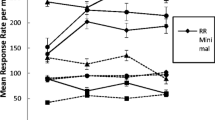Abstract
In order to assess the reductive effects of stimuli associated with different initial DRO values in a program with increasing DRO intervals, a two-phase experiment was conducted in a laboratory setting. In the first phase, subjects responded under a four-ply DRL multiple schedule. In the second phase, they responded under a different multiple schedule [mult (DRO1) (DRO2) (DRO3) (DRL)] in which the initial values of the three Dro components were 1, 12, and 20 sec. Upon criterion responding, values were increased along a series of 1, 2, 6, 12, 20, 30, 42, 56, and 72 sec.
Results of Phase 2 indicated that (a) there were fewer total responses in the DRO1 component than in the other components for all subjects, and fewer responses in the DRO2 than in the DRO3 component for two subjects; (b) the reductive effects of the Dro components transferred to the Drl component; (c) response rates tended to increase initially when the Dro interval was increased for a component; (d) the order of efficiency in establishing schedule control was DRO1 DRO2-DRO3; and (e) a prior history on Dro schedules with small values may have resulted in reduced responding under Dro schedules with higher values. Results were, discussed in terms of factors which can affect the success of Dro schedules in reducing responding.
Similar content being viewed by others
References
CORTE, H. E., ROLF, M. M., & LOCKE, B. J. 1971. A comparison of procedures for eliminating self-injurious behavior of retarded adolescents. Journal of Applied Behavior Analysis, 4, 201–213.
FOXX, R. M., & AZRIN, N. H. 1973. The elimination of autistic self-stimulatory behavior by overcorrection. Journal of Applied Behavior Analysis, 6, 1–14.
KELLEHER, R. T. 1961. Schedules of conditioned reinforcement during experimental extinction. Journal of the Experimental Analysis of Behavior, 4, 1–5.
LANE, H. 1961. Operant control of vocalizing in the chicken. Journal of the Experimental Analysis of Behavior, 4, 171–177.
MULHERN, T., & BAUMEISTER, A. A. 1969. An experimental attempt to reduce stereotypy by reinforcement procedures. American Journal of Mental Deficiency, 74, 69–74.
REPP, A. C, & DEITZ, S. M. 1974. Reducing aggressive and self-injurious behavior of retarded children through reinforcement of other behaviors. Journal of Applied Behavior Analysis, 7, 313–325.
REPP, A. C., DEITZ, S. M., & DEITZ, D. E. D. 1976. Reducing inappropriate classroom and prescriptive behaviors through Dro schedules of reinforcement. Mental Retardation, 14, 11–15.
REPP, A. C., DEITZ, S. M., & SPEIR, N. C. 1974. Reducing stereotypic responding of retarded persons through the differential reinforcement of other behavior. American Journal of Mental Deficiency, 79, 279–284.
REYNOLDS, G. S. 1961. Behavioral contrast. Journal of the Experimental Analysis of Behavior, 4, 57–71.
TOPPING, J. S., LARMI, O. K., & JOHNSON, D. L. 1972. Omission training: Effects of gradual introduction. Psychonomic Science, 28, 279–280.
UHL, C. N., & GARCIA, E. E. 1969. Comparison of omission with extinction in response elimination in rats. Journal of Comparative and Physiological Psychology, 69, 554–562.
Author information
Authors and Affiliations
Rights and permissions
About this article
Cite this article
Repp, A.C., Slack, D.J. Reducing Responding of Retarded Persons by Dro Schedules Following a History of Low-Rate Responding: A Comparison of Ascending Interval Sizes. Psychol Rec 27, 581–588 (1977). https://doi.org/10.1007/BF03394480
Published:
Issue Date:
DOI: https://doi.org/10.1007/BF03394480




